Another mention of the idea of creating a network of metropolitan scale secure bicycle parking facilities
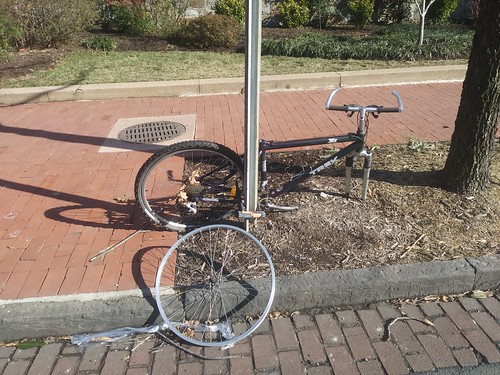
One of the many hindrances to taking up biking for transportation in a regularized fashion is the lack of quality bicycle parking facilities, especially of a secure nature.
This is from entries that have been codified over the past couple years. And builds from the concept of creating a system that supports regularized travel by bicycle, as illustrated by this graphic from a past German national bicycle plan.
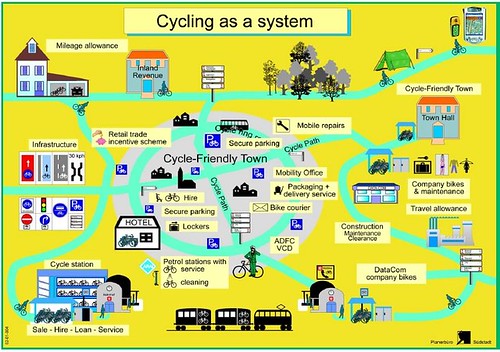
Create a city-wide and metropolitan-wide system of protected bike parking that is easy to use. The Parkiteer system in Victoria State/Melbourne, Australia is the model ("Bike to Work Day as an opportunity to assess the state of bicycle planning: Part 2, building a network of bike facilities at the regional scale").
Centered on Melbourne, the Parkiteer system is a network of 90+ secure bicycle parking cages at railroad and transit stations. While many European, Asian, and South American cities provide similar types of bike cages, Parkiteer is different in that each cage is a node in a common network, rather than each a free standing facility with different membership and entry access systems.
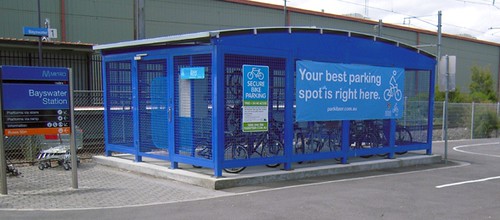
Bayswater Station, Melbourne, Parkiteer Bicycle Parking Cage
I am suggesting the creation of a networked secure bike parking system covering the DC and Baltimore metropolitan areas, one that isn't transit agency/jurisdiction specific, but functional without respect to agency or jurisdiction (like how you can use the SmarTrip/CharmCard across transit agencies, even though technically, the card program is run by WMATA), including:
- key activity centers, not just transit stations;
- use city and county parking structures as opportunities for providing high quality protected bike parking. For example, With the opening of the Purple Line, parking authorities in Montgomery and Prince George's should commit to participating;
- provide such facilities in dense neighborhoods like Columbia Heights DC, where apartment buildings constructed before 1950 typically don't have parking garages;
- rather than focus exclusively on bike cages like the Parkiteer program, work to employ a wide variety of high quality secure bicycle parking options designed according to the location's conditions, opportunities, and potential for the most cost-effective installation;
Ideally, a wide variety of high quality parking options would be employed, not just the "cages" used in the Parkiteer program
.
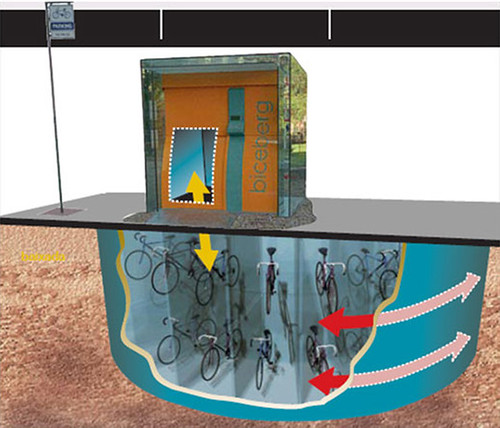
The Biceberg underground bicycle parking system works with an above-ground kiosk.
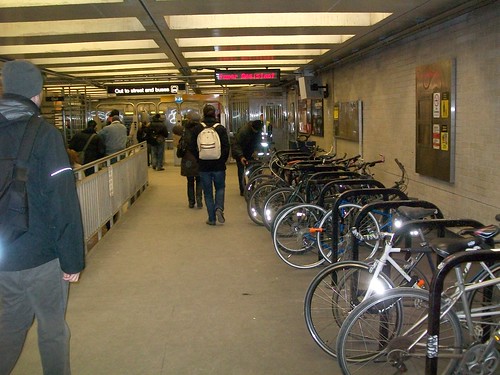
At the Logan Square CTA station in Chicago, protected bike parking is available within the station, behind the fare gates, in interstitial space.
Note that the Biceberg has the capacity of 23, 46, 69, or 92 bikes, depending on the underground configuration (each unit of 23 equals the cubic feet of one parking space), while the bike cages used in the Parkiteer program have a capacity of 30. Plus, it seems that the Parkiteer program's cages are pretty expensive.
In any case there are a variety of spaces (indoors, garages, underground options, etc.) that should be utilized for such a program.
Underground options would be important to incorporate in high density urban neighborhoods, where buildings constructed 100 years ago or more tend to not have spaces that work for conversion to convenient bicycle parking.
There are some proto examples here and there, but they don't operate on the scale or approach of Parkiteer. Santa Ana, California has a few bike shelters in its Downtown that are accessed by paying members. Indianapolis had a similar system called Indiana Bike Port but the program has been discontinued.
Complement a metropolitan-scale bicycle parking system with bike/mobility hubs. In the SF Bay area and in Los Angeles County the transit agencies have a number of bike hubs, although membership is facility specific.
In Los Angeles, bike hubs--with repair and other services--sometimes are paired with secure bicycle parking facilities, such as at LA Union Station.

Bike Hub side of the secure parking facility at LA Union Station.
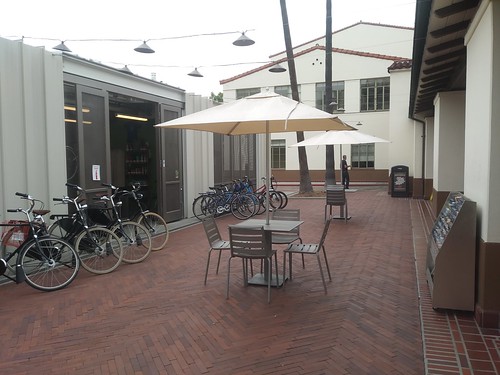
They offer longer term bike rental, have a rack of tourism information (but not good info on local bicycle routes and infrastructure), a patio area for sitting, etc.
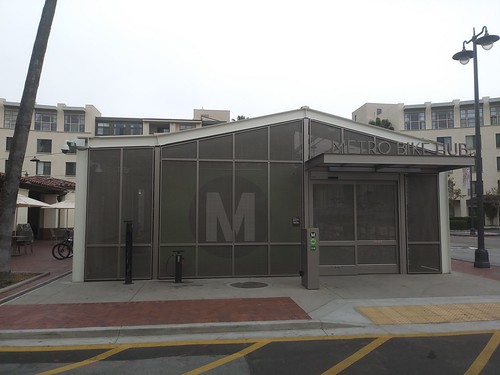
The thing is that from a profit standpoint, it can be tough for these facilities to work out financially, because the demand for bicycle sales etc. can be low. Providing free or severely low rent, working with nonprofit bike co-ops, etc. could be other options.
I also like the idea of positioning these facilities as "lifestyle stores" promoting sustainable mobility as a way to rebrand transit sales and information centers ("LimeBike and "scooter lifestyle stores" as an example of forward marketing for sustainable mobility").
I argue that major transit stations ("Takoma Langley Crossroads Transit Center: a critical evaluation"), airports ("Why not a bicycle hub at National Airport?, focused on capturing worker trips but open to all"), and major districts should have such facilities.
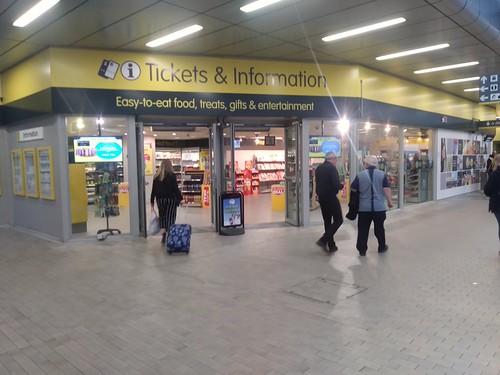
Merseyrail Liverpool transit ticket office
The Bike Center in Santa Monica is a good example of such a center serving a commercial district. They get reduced rent on the ground floor of a parking garage, but otherwise it isn't part of a city transportation initiative. They offer a membership program with access to secure parking, showers, lockers and towel service.
Mobility hubs need to provide/display comprehensive information on bikeways. The Takoma Bicycle Shop has a large poster size copy of the DC Bicycle Map on one of its walls. This kind of treatment needs to be more widespread, especially at transit hubs. The Takoma Bike Shop also has information racks with area bicycle maps and other information. It's not fully comprehensive, but much further ahead of most other bike shops.
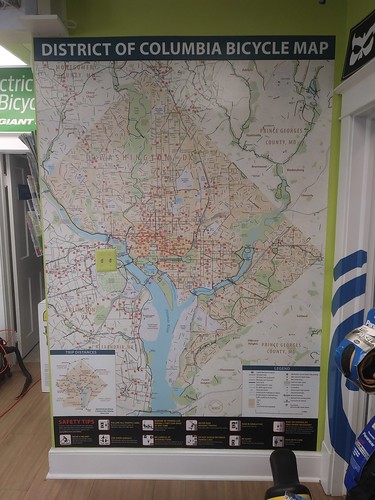
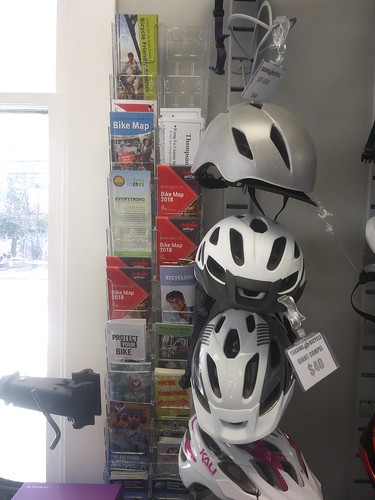
Labels: bicycle and pedestrian planning, bicycle parking, sustainable mobility platform



9 Comments:
off topic:
https://www.politico.com/magazine/story/2019/02/23/karl-racine-profile-attorney-general-emoluments-lawsuit-trump-2020-225200
sorry I haven't been replying much. Local politics is hard!
thanks for this, I likely wouldn't have come across it.
I appreciate your comments always, when you do make them.
... wrt local politics. Good that you're involved. I'm in a burned out phase.
But I've always said in my involvements that it's key to always aim to bring "new people" in and build capacity, figuring that on average, if you can keep people active for a "five year long generation" that's great. Of course, you have to keep filling that pipeline.
e.g., I don't go to planning sessions much, because I expect little will happen.
I didn't go to the Rock Creek East Livability (transportation/DDOT) study kick off. But I relented and submitted 50+ comments...
Library Master Plan sessions are coming up. But I am burned out there too. I was pissed because I wanted to apply for a public engagement position for DCPL, but it had a hard requirement for a masters degree, and I considered applying regardless, but finally came to the conclusion of "what's the use?"
I was more than happy to uncover this great site. I need to to thank you for your time due to this fantastic read!! I definitely enjoyed every bit of it and I have you bookmarked to see new information on your blog.
Hi, just two comments on this post about networked bike parking facilities:
1. There are 8 networked bike stations here in the San Francsico Bay Area's BART system. They all use eLock Technology's BikeLink card as access media. Anyone with a BikeLink card can use the stations which are located in or very near BART stations.
2. Regarding the relative cost of the Parkiteer cages vs. the Biceberg, I don't have any information on construction costs for either, but I am confidend just from looking at the pictures that the Biceberg would be an order of magnitude more expensive to construct and maintain.
@unknown -- thanks for commenting. Years ago when bidding on bike share systems, we were trying to put a bid together for the SF job, and we talked with the guy who at least back then, was running the bike hubs for BART, if I recall, Gene something... Great program. Clearly, LA Metro is modeling their program after BART.
2. Surprisingly, the Parkiteer cages are pretty expensive too.
Yes, I am sure Biceberg is also expensive.
My basic point is that rather than one and only one way of doing things, have multiple ways of implementing bike parking, choosing the one that works best for a particular situation.
Bicebergs work best where space on the surface is at a premium, or with other constraints. E.g., I think Bicebergs would be appropriate to employ in apartment building dominated neighborhoods, like in DC's Columbia Heights where the buildings were constructed at a time without underground space and a lot of people (judging by the number of bikes locked on fences, etc.) cycle.
Just as we have a range of costs for providing car storage (parking) from street to expensive structure, it's reasonable to think of making bike parking equally worthy of investment at a range, depending on need and conditions, especially with the recognition that more people cycling for transportation on a regular basis is a far better use of our transportation infrastructure than an equal number of motor vehicle users.
https://www.nj.com/union/2024/02/locked-glass-shed-coming-to-nj-transit-station-for-commuters-to-store-bikes.html
Locked glass shed coming to NJ Transit station for commuters to store bikes
A new bike depot for commuters will soon open near the train station in Summit, the latest New Jersey municipality to get an upgraded site for commuters to keep their rides dry and locked away while they are at work.
The glass storage is shed is nearly complete and is expected to open this spring, officials said. Located on NJ Transit property near the corner of Union Place and Summit Avenue, the project was organized by Summit officials, the New Jersey Bike & Walk Coalition and NJ Transit.
While most train stations have free outdoor racks for riders to store their bikes, Summit joins a growing list of New Jersey communities installing indoor spaces where commuters can pay a fee to lock up their bikes. Supporters say the sites keep bikes safer from thieves and guarantee riders a dry bike seat to ride home after work, shopping or traveling around town.
Jersey City, Montclair, Bloomfield and Elizabeth have similar bike storage depots. The Bloomfield and Elizabeth sites cost $15 a month or $165 a year. The Montclair site at the Bay Street NJ Transit station charges $20 a month or $220 a year.
The new Summit depot, which stores about 30 bikes, has been requested by cyclists in the community for years, said Amy Cairns, a city spokeswoman.
Two years ago, the Summit Conservancy, an organization focused on sustainability, partnered with the New Jersey Bike & Walk Coalition, a statewide advocacy group, to begin raising funds for the project, she said.
Users will pay a “nominal fee” to get a code to enter and exit the structure to store their bicycles, Cairns said. At other locations, the bike depots have video surveillance to deter thieves and vandals along with racks where cyclists can use their own locks to secure their bikes.
The upgraded security may allow some cyclists to ride more expensive bikes when they commute.
“Those of you who live in nearby towns that do not have train stations can now use your ‘nice bike,’ which may be a safer bike to ride than a ‘station bike,’ to reach a NJ Transit train station,” the bike coalition said on its website.
The New Jersey Bike & Walk Coalition launched its bike depot program in 2014 in Montclair. The coalition then added the depot in Bloomfield in 2017, and one in Elizabeth in 2018.
In 2019, a free bike depot was also installed at the Journal Square PATH Station in Jersey City. The 20-spot bicycle parking facility is called the Oonee Pod.
New Jersey Bike and Walk Coalition developing a very small Parkiteer like network.
https://njbwc.org/bloomfield-bike-depot/
https://njbwc.org/bikedepot/ (Montclair, NJ)
https://www.northjersey.com/story/news/transportation/2017/03/31/bike-depots-connect-cyclists-mass-transit/99714760/
Bike depots connect cyclists to mass transit
The coalition maintains the Montclair depot for about $175 a month, Steiner said. To help offset expenses, the group sells advertising on the depot’s front, also visible from the garage’s car entrance and exit. Rates are about $50 a month per panel, she said.
The coalition rents the space for $1 per year from the township.
The Montclair bike depot features 24 horizontal racks, lockers and a tire pump station. It’s near capacity, Stolar said.
Members pay $20 monthly or $220 annually. There is also a universal membership of $30 for use of multiple bike depots.
“I always have a dry seat,” Helmick said on his way home.
He moved from the city to Montclair five years ago not having much biking experience. With the garage waiting list and the cost to park a car, he started riding a bike to the station, parking at an outdoor rack. His bike was vandalized a couple of times, he said.
When the bike depot opened, the decision was easy to protect his $800 Specialized bicycle, the 44-year-old money manager said. Exercise, affordability and energy conservation also influenced his decision, he said.
Helmick rides his bike 2 miles each way between his home and the station. "It's an important part of my daily routine, and I look forward to it," he said, adding that he now rides a little bit with his children on the weekends.
Before using the bike depot, Montclair resident Elizabeth Salvatore and her husband, Matt, lived at the Bay Street apartments next to the station. However, when they moved to a house in town, bicycles solved the problem of the garage waiting list and a 30-minute walk to the station.
“I think the bike depot is a tremendous benefit for commuters,” Elizabeth Salvatore said in an email. “After parking my bike at one of the open-air bike racks at Bay Street a few years ago, I had my tires stolen, so knowing my bike is secure while I am at work is really important.”
Partners in Health contributed $25,000 of the $32,000 for the bike depot in Bloomfield’s Glenwood Avenue Garage, Steiner said.
The Walk and Bike Coalition operates the depot jointly with the Bloomfield Parking Authority, which rents the space to the group for $1 a year. The parking authority also provides the lighting and surveillance for the enclosure.
The Bloomfield depot has 38 racks, both horizontal and vertical, and features a repair station for minor bike maintenance.
Members pay $15 monthly or $165 annually. As with Montclair members, a $30 universal membership is available.
Happy Bloomfield residents include Marty Epstein, owner of three Morris County bicycle shops.
“Bloomfield is on the cutting edge of sustainable living. Future generations are looking for communities with these amenities,” the coalition board member said. “The last commuter mile is the hardest to accomplish. This completes that last mile.”
The depot also allows commuters to “stay, dine and shop” in the Bloomfield center with no worries, Epstein added.
Teka-Lark Lo, a member of the cycle advocacy group Velo Bloomfield, said she’s been looking for bike-friendly endeavors in Essex County since moving from Los Angeles.
Farther south, the Elizabeth Development Corp. will provide the $40,000 for the bike depot in its Midtown Garage, Steiner said. Once opened in late summer, it will accommodate about 62 bicycles, she said.
Morristown Council President Stefan Armington attended the Bloomfield depot's ribbon-cutting. He said the Morris County seat is considering a 72-rack bike depot off Lafayette Avenue, across from its train station. The project would need NJ Transit approval, he said, adding that there may be financial assistance from Morristown Medical Center.
https://www.nj.com/traffic/2014/10/commute_by_bike_new_montclair_bike_depot_provides.html
Commuters looking to leap frog over a five-year wait for a parking space at the Bay Street train station in Montclair might consider trading in their four-wheeled ride for a two-wheeler.
The township's first 24-space bike parking depot opened Thursday and cycling advocates are looking to it as a model for better bike parking for commuters across the state.
"It gives cyclists a place to safely and securely park their bikes, which is critical for them to have a place to secure their bikes while commuting," said Ralph Monti, president of the Bicycle Touring Club of North Jersey. "It's a safe haven for the bicycling commuter."
Of the clubs 1,500 members, Monti said about 10 percent of them are regular bike commuters, including some who regularly bike across the George Washington Bridge from Bergen County.
Future bike depot sites should be located in regular parking lots, bus depots, train stations, colleges and schools, he said.
The depot is different than the bike lockers that NJ Transit offers for rent at select train stations, which accommodate about 375 bikes. The depot has multi-level bike parking, lockers for rent and an air pump inside a locked facility. NJ Transit also has outdoor bike racks which accommodate about 2,300 bikes.
"With the existing (outdoor) racks that NJ Transit deploys, bikes are subject to vandalism and being stolen," said Cyndi Steiner, executive director of the New Jersey Bike and Walk Coalition, which is handling sign-ups for spaces on its website.
That means commuters will either ride a substandard bike they can afford to lose, but which aren't the safest to ride, or they'll drive, she said. Bikes locked to outdoor racks are also out in the weather.
Cycling advocates and township officials are hoping the ease of parking in the depot will attract commuters who now drive a short distance and park or are driven and dropped off.
Montclair's bike depot cost slightly less than $40,000 to convert from space in the deck intended which was intended for offices, but never built, Steiner said., It's in a location in the deck which can't be used for car parking.
"The first thing is township support and political will," Steiner said. "We went to Montclair with the idea and said, here's a grant, we'll do the rest."
Funding came from grants from Sustainable New Jersey, PSE&G, Partners for Health, and in-kind support from The Pinnacle Companies, a local real estate developer and not from taxpayers, Steiner said.
The best locations to build other bike decks are in parking garages at transit stations, she said Local support and funding are key factors to building other bike depots throughout the state, she said.
Montclair officials said the depot fit in with their concept of a sustainable and healthy community.
"We look at it as a first step to make it easy for the community to not use their cars," said Ray Russell, Montclair Environmental affairs coordinator.
Township officials also said they're interested in expanding depots to the other five train stations in the township.
Post a Comment
<< Home